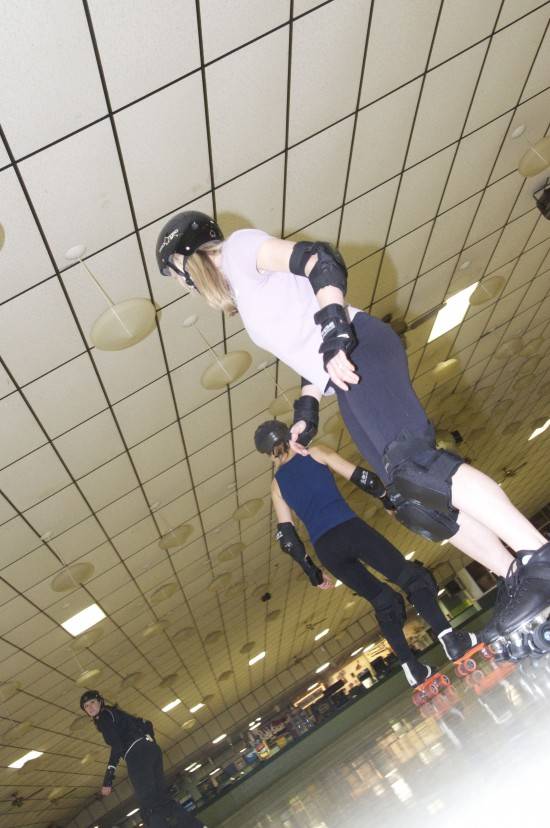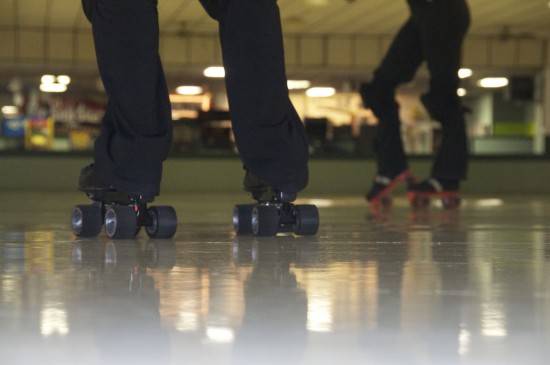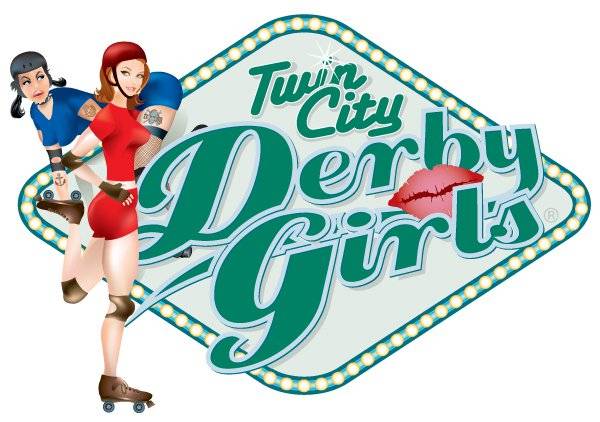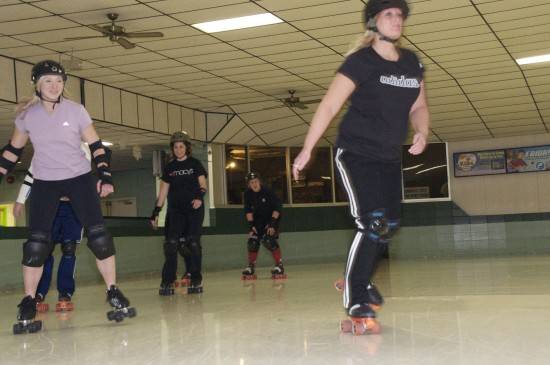 Last Wednesday evening at Skateland in Savoy, roller derby athlete Liz Lerner explained to me what her sport means to her: “We all have our day jobs. I’m a grad student and I work two part-time jobs. And I’m married, and I’m an aunt, and I have a dog. But to have this kind of outlet that you get to go to… it’s great. It’s an aggressive sport, and you can get a lot of things out. You can step away from your everyday life.”
Last Wednesday evening at Skateland in Savoy, roller derby athlete Liz Lerner explained to me what her sport means to her: “We all have our day jobs. I’m a grad student and I work two part-time jobs. And I’m married, and I’m an aunt, and I have a dog. But to have this kind of outlet that you get to go to… it’s great. It’s an aggressive sport, and you can get a lot of things out. You can step away from your everyday life.”
Lerner’s team, Twin City Derby Girls, is an all-female roller derby team that hopes to eventually compete against other teams and raise money for nonprofits. Membership is around ten women right now, but the group hopes to eventually have as many as twenty—enough for two separate five-person teams, including alternates.
The team came together when one of its current members brought up the idea to some friends, “and from there we kind of evolved,” explained Lerner. “Some of the girls hung out together and had a regular networking happy hour.” The team began official practices a few weeks ago.
Going into these first skating sessions, motivations and athletic experiences varied widely among the different members. Lerner, who has played coed soccer in the past, said of her own start with the team, “I wasn’t seeking out roller derby. I was looking to meet more people, and I love being active. I found this great group of girls, and I thought—roller derby, why not? It’s a pretty cool sport, but when we started, I didn’t even really know how to skate! I’d been to probably three middle school horrible, skate/dance type things. But I’m improving; it’s an evolution.”
In flat track roller derby, the type of roller derby Twin City Derby Girls play, two teams compete against each other. Offense and defense are played at the same time. There are five skaters per team. One skater per team is designated as a “jammer,” and they’re the ones who score points. They can be distinguished by the stars on their helmets. When a referee blows a whistle, the jammers have a two-minute period of time called a “jam” to fight their way through the opposing team ahead of them, who try to block them. If and when the jammers fight their way through the pack, they can start scoring points by lapping skaters on the opposing team. 30 seconds after a jam ends, another begins. Players use their shoulders, elbows, and butts to block. Penalties are given for illegal blocks and unsportsman-like conduct. It’s a high-speed, adrenaline-pumping contact sport, to say the least.

The team recently went on a road trip upstate to check out the Rockford Rage Bout (a bout is the term for a roller derby match)—the kind of bout they hope to host themselves eventually at Skateland—and came back from the adventure even more pumped. Lerner said, “It’s so unique, and it’s kind of addicting. When we went to our first bout up in Rockford, and it was just really inspiring to see these really tight groups of women who just really kicked ass at a sport. You wanted to be those women.”
When Lerner told her father that she was getting into roller derby, his reaction was, “Roller derby? You know, it’s like professional wrestling, where they decide who’s going to win beforehand.” But dad was wrong—it’s a very legitimate sport where the outcome is not predetermined or staged.
“That’s not to say that there isn’t a strong element of camp and showmanship to roller derby. Roller derby began at least as early as the 1920’s, and has been played professionally—with varying degrees of success and popularity—since then. However, most bouts these days are grassroots and amateur, and, as such, skaters control their own images. Teams are almost always entirely female and theatrics are part of the fun.
Skaters take on “derby names”. Lerner explained, “There’s something cool about picking your derby name. It’s kind of your alter ego.” She started out thinking that Tin Lizzy might be a good derby name for herself, but after checking the International Rollergirls’ Master Roster website, she learned that the name was already taken. As with race horses, it’s not good for different skaters to have the same name. So she settled on the name Hips Don’t Lie, which is hers alone, the inspiration being that, “I think I have a set of hips that could help me out in this sport of derby.”
 Not only do individual skaters take on derby names, but teams develop their own individual themes, where skaters dress accordingly. One U.S. team (derby is an international sport) skates with an Alice In Wonderland theme, while other organizations take more adult ones: for instance, another U.S. team has a dominatrix theme. As of now, the Twin City Derby Girls are themeless. Lerner said that—while she can’t speak for her whole team—she thinks the Twin City Derby Girls will keep it clean when they finally decide: “It will probably come out when we start doing bouts. I was thinking something farming related, because of where we’re from. But I don’t think that’s going to work out, because none of us actually have farm careers, that I know of. I just can’t say yet…”
Not only do individual skaters take on derby names, but teams develop their own individual themes, where skaters dress accordingly. One U.S. team (derby is an international sport) skates with an Alice In Wonderland theme, while other organizations take more adult ones: for instance, another U.S. team has a dominatrix theme. As of now, the Twin City Derby Girls are themeless. Lerner said that—while she can’t speak for her whole team—she thinks the Twin City Derby Girls will keep it clean when they finally decide: “It will probably come out when we start doing bouts. I was thinking something farming related, because of where we’re from. But I don’t think that’s going to work out, because none of us actually have farm careers, that I know of. I just can’t say yet…”
Of the group’s vision for their role in the greater Champaign-Urbana picture in general, she said, “I’d really like it to be something the community looks forward to. I’d love to see a packed house when we eventually have our bouts. It’s a family event. We’ve all had so much fun with the roller derby so far, that we want it to be something positive for the community.”
Interestingly enough, Twin City Derby Girls aren’t the only emerging roller derby organization around town. In recent months, another team, C-U Rollers, has also started practicing and preparing for bouts, changing the local derby scene from nonexistent to one where there’s two all-female groups in Champaign County.
Lerner said that, at one point, women from both of what became the two separate groups attended the same organizational sessions. However, the C-U Rollers were getting together at the time for their meetings in Rantoul and some of the Champaign-Urbana women didn’t want to commute that far. So, they started to do their own thing. She denied any bad blood between the two teams: “I wouldn’t say that we’re in opposition. I think that it’s cool that there are two leagues, and I think that it’s going to be really good in terms of raising awareness of roller derby.”

However, when the other closest competition is as far away as Chicago, Rockford, and Indianapolis, bouts between the two C-U organizations seem not only inevitable, but something Twin City Derby Girls are looking forward to. Lerner said of the possibility of future contests, “That’s the hope. To be a registered in a derby league, you have to have four bouts a season, and I’m sure—out of those four—we’d go against them. That would be a lot of fun.”
Any Twin City Derby Girls bouts, local or otherwise, are still some time away. “When we’ve talked to other teams around the country, they’ve said that you need at least six months for your team to really gel,” Lerner said.
There are a lot of reasons why putting together a derby team can’t be rushed, not least of which is the dangerous nature of the sport. Skaters are injured frequently even with the best of training and teamwork. Twin City Derby Girls, like most derby teams in—or seeking to be in—a registered derby league, require that all their members carry health insurance. So far, just in practices alone, Twin City Derby Girls have had one girl fracture a wrist and there have been numerous cuts and scrapes. In the practice I observed, one girl did something painful to her hamstring and another took a spectacular wipe-out—and I didn’t even watch that long.
When questioned about the risk, Lerner elaborated, “The possibility of injury isn’t all that appealing, but I like that there’s a little bit of danger.” Like most derby teams, Twin City Derby Girls wear helmets, wrist guards, elbow and knee pads, and—for the bouts, at least—mouth guards. She said that, for her, hitting the rink for the first time wearing the protective equipment gave her a lot of confidence and made her a less timid skater. As far as the frequent bruises, aches, pains (and worse) that come with the sport, she agreed that—while masochism is a little too extreme a word—there’s definitely a thrill-seeking component: you only gain what you risk and the possibility of pain is part of that.
According to her, while roller derby is inarguably dangerous, unnecessary roughness isn’t what the sport is really all about these days: “There are all kinds of misconceptions from the 60’s and 70’s that you get in fistfights and throw elbows and all that, but when it comes down to the rules, none of that is allowed. You can knock the other player out just by using your hips and your lower body. It’s not as intimidating as some women think it is.”
So who are these derby girls? For the most part, they are in their twenties and thirties, although there is one woman in her forties. Lerner explained that there’s no definitive or required type of day job, and that girls from all walks of life are welcome. Currently, the team includes a sex educator, a public health employee, an engineering grad student, and a professor. Team member Amber Carmer stressed that, while you have to be at least 21 to join, there is no upper age limit and older women are encouraged to join.
Lerner said that the group is recruiting, and women who think they might not be the right “type” should think again. She feels that there is a common misconception that derby girls always have physically intimidating body types and hardcore looks and personalities to match: “You don’t have to have tattoos; you don’t have to have piercings. You don’t have to be a smaller girl or a bigger girl. It’s just the attitude that counts.
To women who are considering joining Twin City Derby Girls, she said, “You don’t have to try out. If you want to be part of this, and you have a good attitude, we’re all for it. We’ll show you the ropes of how derby is played.”
Moreover, women who don’t want to skate but still want to help can do so from rinkside: “If there are women out there who think contact isn’t for them, they can help out in another way.” Men are encouraged to pitch in as well. She said, “We need guys. We need refs, we need scorekeepers. We need help setting up—we need all the help we can get.”
In general, she said, significant others of all flavors have been cool about what their derby girls are doing. One boyfriend has volunteered to referee, which is a highly skilled job; another is helping out with driving duties. She said of her own hubby, “My husband is in the military. He’s deployed right now. He’s very supportive, but he’s like, ‘I’ll believe it when I see it.'”
Currently, the Twin City Derby Girls are paying their own expenses, but they hope to one day raise enough to be able to meet costs and give to deserving organizations. The team hasn’t picked a charity yet for the money they hope to raise through bouts and other events, but Lerner said, “We’ll probably stick with some kind of women’s nonprofit.” For now, raising money is more an obstacle than figuring out to whom to give it to.
The team practices and plans to hold their bouts at Skateland. Lerner said, “The owners of Skateland have been great and willing to help. They actually have a speed skating practice that a few of us have been going to on Sundays.”
Overall, Lerner feels that things are “rolling” along pretty much according to schedule. Her state of the derby girls assessment was as follows: “We’re finding that as a team, we’re getting closer, and we’re progressing as individuals. You start out kind of in this humbled state, like ‘Oh I’m bad on these skates’, but you grow and grow and you form these friendships. It’s just kind of about empowering women, I think. That’s kind of our thing.”
When questioned about the existence of any larger statement the group may be trying to make, she said, “It’s about empowering women, raising money for nonprofits, and having fun.”
If you want to support Twin City Derby Girls, the group is hosting their “Talk Derby to Me” fundraiser at Boltini’s tonight, February 3rd, 2010, from 5:30pm to 7:30pm. They encourage anyone to come out and give a suggested donation of $5.00 “for a select variety of complimentary appetizers,” and to “have a cocktail, meet the Twin City Derby Girls, and learn about the all-female sport rolling into Champaign.”








